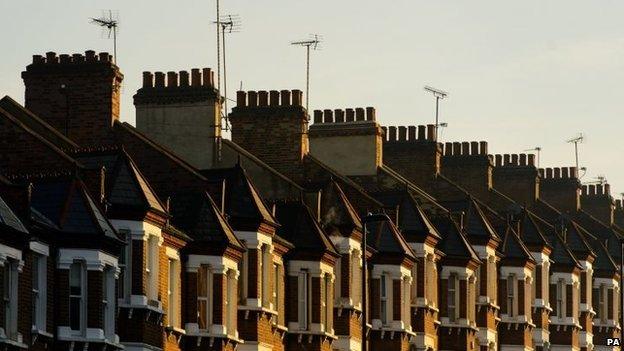A policy to test tenants of the House
- Published

The policy hasn't even been spoken aloud yet, but already it's been hailed by the Tories as "Venezuelan-style rent controls".
Interesting, that. They'd love to paint Ed Miliband as a Hugo Chavez-style communist.
But Labour knows - I suspect - that the 9m people in England living in 3.8m rented homes will probably be hanging the bunting out (carefully, Blu-Tack only, nothing permanent etc) at the party's plans to make three-year tenancies the standard contract.
What does this mean? Essentially that Labour has picked out private landlords as belonging to a "predator" class. And it's seeking to redress the balance between landlords and their tenants, who often end up with little security and rising rentals.
Politically, it's easy to see where this is going. It fits Labour's cost-of-living narrative brilliantly. They sound as radical on tenancy agreements as they did on energy pricing last autumn.
Upper ceiling
Labour isn't suggesting a return to post-war rent controls, but it is suggesting that once a market rate has been fixed between tenant and landlord, legislation would place an upper ceiling on any increases - based on a benchmark such as average market rents.
It also wants to ban letting agent fees for tenants, which they reckon would put another ┬Ż350 on average back into their pockets.
As for landlords? Well, expect them to hate it. Rob Thomas, from Wriglesworth Consultancy, says it's the first step to "undermining the market system in renting".
He anticipates distortions will be created in the market and "those supplying the product will be discouraged - leading to prices going up".
Would they though? Landlords have been pulling in 16% profits per year on average. Would they really be willing to sacrifice that sort of cash?
'Commie taunts'
The real question I suspect is how much practical difference this policy would make.
Landlords may be tied into a three-year term - but they could get out of it with two months' notice if their circumstances changed - ie they had to sell the property or move in to it.
Would that simply become an excuse to kick out tenants they no longer want? Would anyone be checking up on landlords once they had made their case for change - to see if they really did move back in?
But that, I suspect, is for much further down the line. For now, Labour knows that if it gets round the commie taunts, its plans will chime quite strongly.
Why? Simply because there are many more long-term tenants. Savills estate agency, in west London, tells me what would be the traditional 25- to 35-year-old first-time buyers simply aren't buying any more as prices are too high - they're renting.
'Way of living'
Indeed, Fiona, who lives in Colchester with her three children, tells me she has rented all her adult life. It's not a temporary stop, it's a way of living.
A few more figures will flesh out the picture when working out whether this policy proposal will fly or not: nine million people live in private rented accommodation. Just 2% of the UK population are private landlords.
But take a look in Westminster and the picture is rather different. Some 12.5% of Labour MPs are private landlords. That number doubles when you look at Tory MPs.
So, bear this in mind when you watch the political reaction - Ed Miliband sees himself as the champion basher of the vested interest. This policy may come to test the tenants of one very particular House.
You can hear more on this on Newsnight on ┤¾Ž¾┤½├Į Two from 22:30 BST.
- Published9 July 2020
- Published26 February 2014